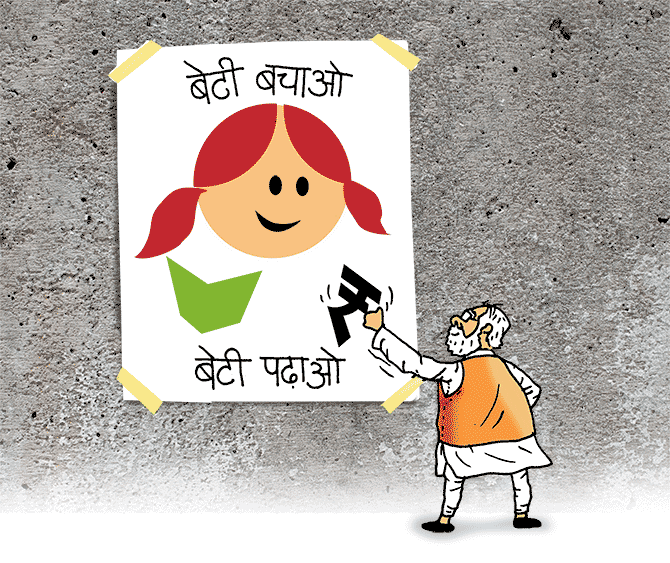Perhaps, more daughters will feel more loved if the Beti Bachao Beti Padhao scheme were to be replaced, says Geetanjali Krishna.
Illustration: Dominic Xavier/Rediff.com

"The stars are just not favourably inclined towards my family right now,"” said Pushpa.
She had lost weight, her skin looked lacklustre and there were dark circles of worry and sleeplessness under her eyes.
It turned out her 18-year-old son was in hospital with viral hepatitis.
"I haven't slept for three nights tending to him," she said.
On further questioning, I ascertained that the boy was on his way to recovery. "Two days ago the doctor said we could take him home, but we wanted him to be on a drip a little while longer to be on the safe side," she said.
"He's our only son you know."
Pushpa's son had fallen ill 10 days ago.
Unable to digest his food, he quickly became weak and dehydrated.
"As soon as his blood test came back positive for viral hepatitis, we had him admitted in a private hospital," she said.
"We have already spent over Rs 30,000 on his treatment." It was fortunate, I said, that they had had the blood test done so quickly.
Often, cases of jaundice went undiagnosed for the first two weeks, increasing the risk of secondary afflictions and delayed recovery.
"When he became sick, we knew exactly what it was," she said. "We'd seen the symptoms before."
It turned out that her nine-year-old daughter had the same ailment two weeks before.
"She's okay now," she said. "You know, girls are much more resilient than boys."
Apparently, Pushpa and her husband realised quite late, that their daughter wasn't well.
She hadn't been eating well for days, but Pushpa's eldest daughter, now 19 and who looked after her younger siblings, didn't mention it to her parents.
"We took her to the doctor after she'd been sick for several days," said Pushpa.
When her blood report confirmed viral hepatitis, the doctor advised bed rest, lots of liquids and minimal medication.
I wondered aloud why she, one of the rare women to have completed Class 12 in her community, over-reacted when her son contracted the same ailment.
Pushpa grudgingly admitted that perhaps there was a difference in how she had dealt with her son and daughter falling ill.
Could the age-old north Indian son preference be rearing its ugly head, I asked.
She told me a story instead of answering the question.
"Our neighbours, like us, also brought up their son and daughter equitably," she said.
All was well until the son decided to move out of their home once he had children.
Once the neighbour, a mason, became too old to work, his wife, who did occasional tailoring assignments, and the daughter, a teacher, ran the household.
"When the daughter left home after marriage, the son stepped up with financial support," Pushpa said. "But he said that he couldn't do too much, as he too had children to educate."
Fearful of a similar future, Pushpa began lavishing extra attention on her son.
"I spend equally on all three children, give them the same food and pray that they'll all do well, but I save a special smile for my son," she said.
"We want him to remember how well we've looked after him, so he will look after us in our twilight years."
Pushpa went away, leaving me with my thoughts.
If her husband and she had a pension to make them financially secure in their old age, would they lavish the same affection on their daughters, as they did on their son?
Perhaps, more daughters will feel more loved if the government's Beti Bachao Beti Padhao scheme were to be replaced, or even better, bolstered, with a better pension scheme for the unorganised sector.










